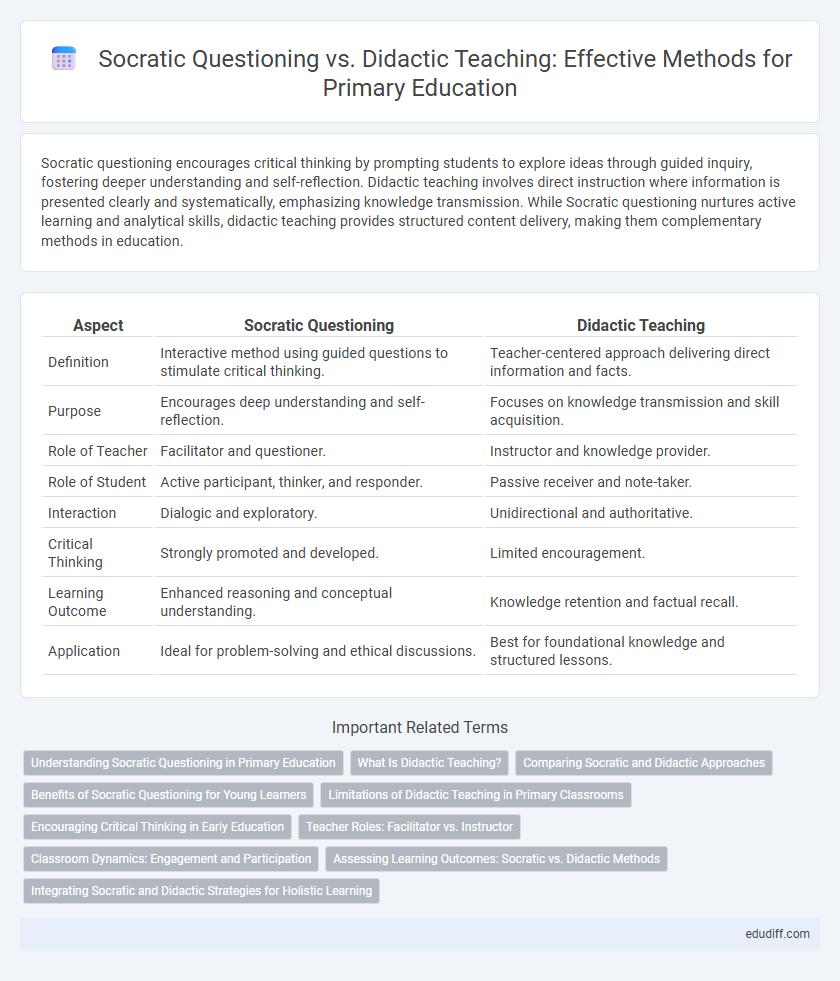Socratic questioning encourages critical thinking by prompting students to explore ideas through guided inquiry, fostering deeper understanding and self-reflection. Didactic teaching involves direct instruction where information is presented clearly and systematically, emphasizing knowledge transmission. While Socratic questioning nurtures active learning and analytical skills, didactic teaching provides structured content delivery, making them complementary methods in education.
Table of Comparison
| Aspect | Socratic Questioning | Didactic Teaching |
|---|---|---|
| Definition | Interactive method using guided questions to stimulate critical thinking. | Teacher-centered approach delivering direct information and facts. |
| Purpose | Encourages deep understanding and self-reflection. | Focuses on knowledge transmission and skill acquisition. |
| Role of Teacher | Facilitator and questioner. | Instructor and knowledge provider. |
| Role of Student | Active participant, thinker, and responder. | Passive receiver and note-taker. |
| Interaction | Dialogic and exploratory. | Unidirectional and authoritative. |
| Critical Thinking | Strongly promoted and developed. | Limited encouragement. |
| Learning Outcome | Enhanced reasoning and conceptual understanding. | Knowledge retention and factual recall. |
| Application | Ideal for problem-solving and ethical discussions. | Best for foundational knowledge and structured lessons. |
Understanding Socratic Questioning in Primary Education
Socratic questioning in primary education fosters critical thinking by encouraging students to explore ideas through guided inquiry rather than memorization. This method enhances comprehension as pupils articulate their reasoning, leading to deeper understanding compared to didactic teaching's direct instruction style. Emphasizing open-ended questions, Socratic dialogue cultivates independent thought and problem-solving skills essential for foundational learning.
What Is Didactic Teaching?
Didactic teaching is a traditional instructional approach where the teacher delivers structured content directly to students, emphasizing memorization and factual knowledge acquisition. This method often involves lectures, demonstrations, and standardized assessments to ensure comprehension and retention. It contrasts with Socratic questioning by prioritizing authoritative knowledge transfer over critical thinking and dialogue-based exploration.
Comparing Socratic and Didactic Approaches
Socratic questioning promotes critical thinking by encouraging students to explore ideas through guided inquiry, fostering deeper understanding and active engagement. Didactic teaching delivers structured knowledge through direct instruction, emphasizing memorization and clear explanations for foundational concepts. The Socratic method cultivates analytical skills, while the didactic approach ensures efficient content delivery and mastery of basic information.
Benefits of Socratic Questioning for Young Learners
Socratic questioning promotes critical thinking and deep comprehension among young learners by encouraging them to analyze and articulate their ideas independently. This method fosters active engagement and curiosity, leading to improved problem-solving skills and retention of knowledge. Unlike didactic teaching, which often relies on passive reception, Socratic questioning cultivates a learner-centered environment that supports cognitive development and self-confidence.
Limitations of Didactic Teaching in Primary Classrooms
Didactic teaching in primary classrooms often limits student engagement and critical thinking by promoting rote memorization instead of active learning. This approach can hinder the development of problem-solving skills and reduces opportunities for personalized feedback. As a result, students may struggle to internalize concepts deeply, impacting long-term retention and understanding.
Encouraging Critical Thinking in Early Education
Socratic questioning in early education fosters critical thinking by prompting students to explore ideas through open-ended queries, encouraging deep reflection and active learning. Didactic teaching, while effective for delivering foundational knowledge, often limits opportunities for students to engage in analytical reasoning. Integrating Socratic methods within primary classrooms enhances cognitive development by promoting curiosity, problem-solving skills, and independent thought.
Teacher Roles: Facilitator vs. Instructor
Socratic questioning positions the teacher as a facilitator who guides students through critical thinking by asking open-ended questions that stimulate reflection and deeper understanding. In contrast, didactic teaching casts the teacher as an instructor who delivers information directly, structuring knowledge through lectures and explicit explanations. The facilitator role encourages learner autonomy and active engagement, while the instructor role emphasizes knowledge transmission and content mastery.
Classroom Dynamics: Engagement and Participation
Socratic questioning fosters active classroom dynamics by encouraging students to think critically and participate through open-ended dialogue, enhancing engagement and deeper understanding. Didactic teaching often results in passive learning, where students receive information without interaction, limiting opportunities for critical thinking and collaborative participation. Emphasizing Socratic methods in primary education promotes a more dynamic and inclusive learning environment, increasing student motivation and retention.
Assessing Learning Outcomes: Socratic vs. Didactic Methods
Socratic questioning enhances critical thinking and deeper understanding by encouraging students to actively engage and reflect on concepts, leading to improved long-term retention of material. Didactic teaching delivers structured information efficiently, often resulting in quick knowledge acquisition suitable for foundational learning but may limit analytical skills development. Assessment of learning outcomes reveals that Socratic methods better foster problem-solving abilities and intellectual autonomy, while didactic approaches primarily support factual recall and standardized test performance.
Integrating Socratic and Didactic Strategies for Holistic Learning
Integrating Socratic questioning with didactic teaching enhances holistic learning by combining critical thinking development with structured knowledge delivery. Socratic methods encourage deep inquiry and reflection, while didactic approaches provide clear, concise information essential for foundational understanding. This synergy promotes active engagement and retention, fostering a comprehensive educational experience in primary classrooms.
Socratic Questioning vs Didactic Teaching Infographic

 edudiff.com
edudiff.com